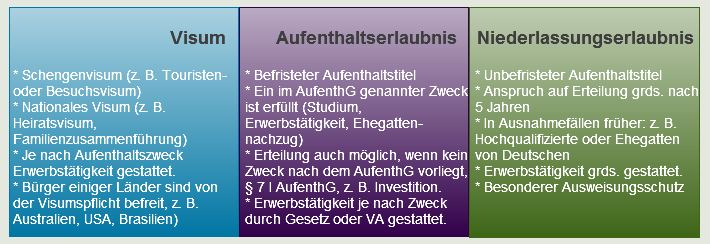Administrative Court of Berlin, Decision from March 6, 2009, Case No.: 10 L 53.09
Delays in Procedures at Embassies/Consulates
For years, there has been a noticeable trend, particularly in immigration law, where decisions by immigration authorities or embassies/consulates take increasingly longer.
This can lead to significant disadvantages for foreign nationals when urgency is required. For example, this is the case when a wife living in Germany is pregnant, and her husband living abroad wishes to be present at the birth. In such scenarios, a visa application due to pregnancy might be necessary. To ensure swift legal protection in these cases, foreign nationals can secure their rights in court through interim relief procedures. These are known as urgent relief or interim relief proceedings.
When Urgency Exists (e.g., Visa Due to Pregnancy), an Urgent Procedure Can Be Initiated
Interim relief differs from normal lawsuits in that it involves a quick decision based on a preliminary examination. Therefore, the evidence requirements are less stringent than in the main proceedings, with affidavits playing a significant role.
An urgent application is justified when the applicant successfully demonstrates both the urgency and the underlying claim to the court.Case Overview:
The case presented here concerns proceedings for interim legal protection before the Berlin Administrative Court. In these proceedings, the father of an unborn child, who is in Germany, applied for interim relief in order to be with his child in Germany before the birth.

Facts of the Case:
Turkish Father Seeks to Be in Germany for the Birth of His Child
The applicant was a Turkish citizen whose wife, a German national, was pregnant with his child. His wife resided in Germany. The husband had already applied for a spouse reunification visa to join his German wife, but the application was denied, leading to a pending lawsuit at the Administrative Court in Berlin.
The wife’s pregnancy had been discussed between the parties during the lawsuit, and the respondent (the Federal Foreign Office or embassy) had indicated that a visa might be granted if the immigration authority gave its consent.
Father Files Urgent Application at the Administrative Court of Berlin
As the birth was imminent, the applicant filed the urgent application that is the subject of this decision.
Decision of the Administrative Court of Berlin:
The Administrative Court of Berlin ruled that the applicant had sufficiently demonstrated both a claim for relief and urgency.
Establishing the Claim for Relief for Entry into Germany
Although the applicant could not successfully rely on Section 28(1) Sentence 1 No. 3 of the Residence Act (AufenthG), which grants a residence permit to a parent of an unmarried minor German child, as the child had not yet been born and did not have an established residence in Germany, the court recognized other grounds for relief.
Court Rules that the Father Cannot Rely on Sections 28 or 22 of the Residence Act
The court found that the applicant could not rely on Section 28 or Section 22 of the Residence Act, as the statutory conditions, particularly the existence of urgent humanitarian reasons, were not met.
However, the Father Can Rely on Section 7(1) Sentence 3 of the Residence Act, as the Claim for Family Reunification with an Unborn Child Is Not Explicitly Regulated
The court held that the applicant could successfully rely on Section 7(1) Sentence 3 of the Residence Act, which allows for the issuance of a residence permit for purposes not explicitly covered by the Act. The court recognized that the desire to be present at the birth of one’s child is a valid reason, even though it is not specifically regulated by the law.
§ Section 28 para. 1 sentence 1 no. 3 AufenthG presupposes - as stated - that the child is already born. Section 28 para. 1 sentence 1 no. 1 AufenthG also does not take into account the relationship to a child about to be born. A justified case also exists. The granting of the residence permit appears to be objectively justified.
The court emphasized that the protection of family life under Article 6(1) of the German Basic Law (GG) extends to the relationship between the applicant and his wife, who was close to giving birth, as well as to his unborn child.
Embassy/Federal Foreign Office Must Use Discretion to Approve the Entry
The court determined that the discretion granted to the respondent (the Federal Foreign Office or embassy) was narrowed in this case, such that the only lawful exercise of discretion was to grant the visa.
In the present case, it must be taken into account that - in addition to the scope of protection of the fundamental right set out above, which must be included in these considerations - the applicant directly acquires a right under Section 28 (1) sentence 1 no. 3 AufenthG with the birth of the then German child. The immigration authority does not deny this either, but rather states that it intends to give its consent to the granting of a visa after the birth of the child. Taking these circumstances into account, denying the applicant entry for the birth of his child would not be in line with the state's duty of protection under Article 6(1) of the Basic Law. On the contrary, keeping the applicant away from the birth would appear to be mere harassment.
Finally, the - theoretically conceivable - possibility that the child does not survive the birth cannot be held against this right of the applicant. For in this case, in view of the state's duty to protect, it must be taken into account that the applicant's wife would then be in particular need of his presence and assistance.
Since the Birth Is Imminent, There Is Also an Urgent Need for the Father
The court recognized that the applicant faced the disadvantage of not being able to be present for the birth of his child or to support his wife. The court found that this disadvantage outweighed any concerns of the respondent or the immigration authority.
Source: Administrative Court of Berlin
Important Note: The content of this article has been prepared to the best of our knowledge and belief. However, due to the complexity and constant evolution of the subject matter, we must exclude liability and warranty. Important Notice: The content of this article has been created to the best of our knowledge and understanding. However, due to the complexity and constant changes in the subject matter, we must exclude any liability and warranty.
If you need legal advice, please feel free to call us at 0221 - 80187670 or send us an email at or send an email to info@mth-partner.de info@mth-partner.de
Lawyers in Cologne advise and represent clients nationwide in immigration law.





One Response
I am in the 16th week of pregnancy and my husband still lives in Turkey unfortunately he still hasn't got a visa how can I get on with this can you help me?
Yours sincerely